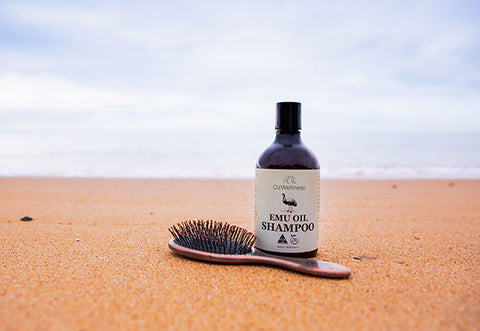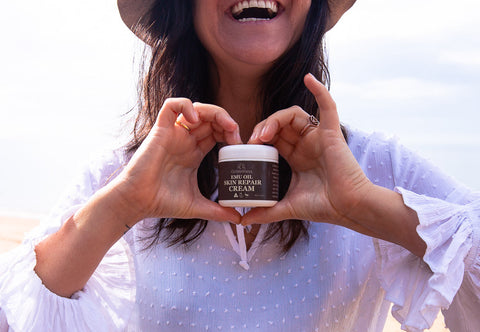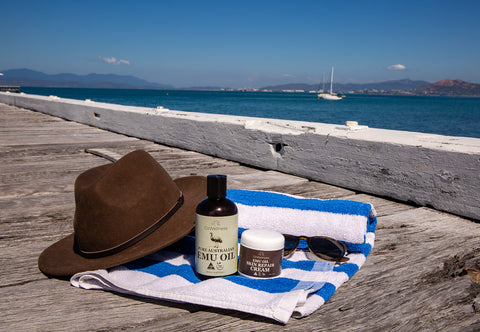OzWellness blog
Need a hand with dry & damaged skin from hand sanitiser?

Firstly, sorry about the 'hand' pun in the blog title. But in all seriousness, as important as hand sanitiser ('sanitizer' for all the Americans reading this blog) is in recent times with COVID-19, it really sucks for your skin. The alcohol and other ingredients in the sanitiser can be quite unforgiving on your hands. These tend to dry out the skin causing irritant dermatitis and symptoms such as rashes, peeling, dryness and even bleeding. This is where emu oil can step in, particularly if you have to sanitise your hands often, such as those who work in healthcare.
Irritant contact dermatitis (ICD)
This is the most common problem caused by using hand sanitisers. It is the likely culprit resulting if you have skin problems on your hands from this. In COVID times it is more than likely you have personally experienced the effects from this already. One study actually noted that 25% to 55%, and as many as 85% of nurses who regularly sanitised their hands experienced ICD. Irritant contact dermatitis can result in symptoms such as itchiness, dryness, peeling, redness, cracking and even bleeding on the skin around the hands and fingers. These symptoms can range from mild to chronic, and may be temporary or recurring dependent on many factors.
ICD is an inflammatory condition caused by direct damage to the stratum corneum (outer layers of skin) from the alcohol and other agents commonly found in hand sanitisers. It causes notable damage because it occurs at a rate faster than the natural ability of the skin to repair itself. Interestingly, dry climates like we experience in most of Australia, actually increase the severity and occurrence of ICD. Fortunately, unlike allergic contact dermatitis (outlined below), ICD of the hands is quite easily prevented and treated with proper methods, especially emu oil!
Allergic contact dermatitis
Although this is very rare, some people do experience allergic contact dermatitis from the use alcohol-based hand sanitisers. It is usually derived from an allergic reaction from the fragrances, preservatives and emulsifiers added to certain products, and in particularly rare cases, from the alcohol itself. One study noted that the few nurses who experienced this were able to resume use of the sanitiser after a brief hiatus. If you are experiencing more pronounced or ongoing symptoms on your hands from the use of sanitisers or other potential contaminants, this may be something you wish to discuss with your doctor.

Before and after shots (4 days between photos) submitted by a customer who used our emu oil to repair his dermatitis caused by hand sanitisers.
Why is emu oil so good for hand dermatitis?
The best way to prevent and treat hand dermatitis is with a good moisturising barrier cream. We might be biased, but in our opinion there is simply no better product that does this than emu oil. Better still, emu oil is 100% natural and perfect for use on sensitive skin. It works to counter and prevent ICD dermatitis because:
- Forms a sealed barrier over the skin to prevent further contamination and encourage healing
- Is transdermal, so it penetrates all 7 skin layers, delivering its many benefits deep within the epidermis
- High in Omegas 3,6, 9 (70%) which fight inflammation, soothe, moisturise and repair damaged skin
- Is hypoallergenic so as to not cause any further irritation or interact with agents in the sanitizer
- Is anti-microbial & bacteriostatic, so prevents the growth of bacteria and promotes healing
- Has a nutrient-dense bioactive profile to immediately soothe irritation and repair the skin
How to use emu oil to counter the effects of hand sanitiser
It is very simple to use emu oil to counter the damaging effects of hand sanitisers. Simply rub a few drops of the pure oil all over your palms and fingers, covering all areas of the hand. Make sure you rub it in good until it is absorbed into the skin, especially in between the fingers where irritation often occurs. DO NOT use emu oil right before you wash or sanitise your hands, as the barrier it forms may prevent proper disinfection. It is better used a select few times throughout the day/evening between sanitising, or if you are actively experiencing dermatitis or have very sensitive skin, used each time after you wash or sanitise your hands. Once the immediate issue is cleared up, you can use 2-3 times a day ongoing to prevent future irritations.
Other useful advice
Choosing the right sanitiser
Although in most cases the skin reactions are due to the alcohol in the sanitiser, you may find certain products contain additional ingredients which cause this or make it worse. One option is to choose a hand sanitiser brand that contains the bare minimum ingredients without all the added extras. For this, just make sure your sanitiser is made from of at least 60% alcohol and only glycerol, hydrogen peroxide and water is added. This is the recommended World Health Organization (WHO) formula. Other ingredients like parabens, artificial dyes, fragrances, PEGS and certain oils sometimes found in some sanitiser brands are simply not needed, and as such should really be avoided.
Don't wash before/after before sanitizing
Some people think that washing their hands with soap before and/or after using hand sanitiser can help reduce skin irritation. This is in fact quite the opposite. Doing so can actually cause (or exacerbate) dermatitis as noted by one study. The better option is to either use the sanitiser or wash your hands with soap, not both.
Don't put gloves on wet hands
Especially for healthcare workers, it is important if you have to wear gloves, to not put these on if your hands are wet after washing them or using sanitiser. This increases the risk of skin irritation. One study recommended either drying the hands first or not washing/sanitizing before wearing gloves.
A final word
The need to constantly wash and sanitise our hands because of COVID is now a necessary part of daily life. That doesn't mean you need to put up with dry, damaged and irritated skin from doing so. Keeping a bottle of our pure emu oil on-hand and using as instructed, will keep your hands moisturised and protected. Of course the benefits of emu oil don't stop at your hands, and you can also use it for many other common skin, hair and inflammation-related problems too - see all uses here. Finally, a big shoutout to all our healthcare workers, both here in Australia and abroad, who are working under very tough conditions at the time of this article looking after the many COVID cases in hospitals. Your work is very much appreciated.



